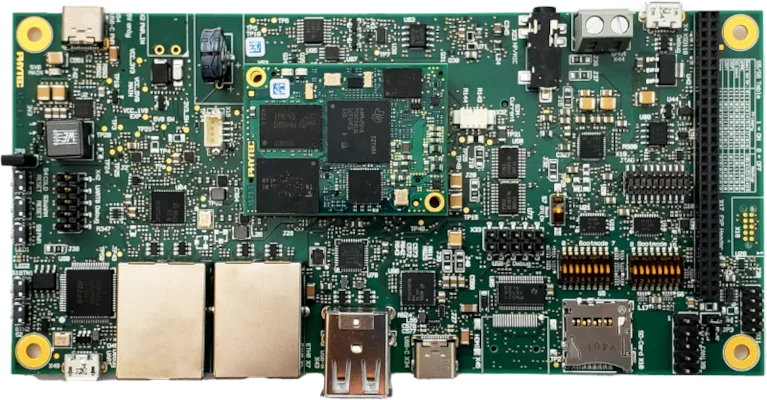phyBOARD-Lyra AM62x M4F Core
Overview
The phyBOARD-Lyra AM62x board configuration is used by Zephyr applications that run on the TI AM62x platform. The board configuration provides support for the ARM Cortex-M4F MCU core and the following features:
Nested Vector Interrupt Controller (NVIC)
System Tick System Clock (SYSTICK)
The board configuration also enables support for the semihosting debugging console.
See the PHYTEC AM62x Product Page for details.

PHYTEC phyBOARD-Lyra with the phyCORE-AM62x SoM
Hardware
The phyBOARD-Lyra AM62x kit features the AM62x SoC, which is composed of a quad Cortex-A53 cluster and a single Cortex-M4 core in the MCU domain. Zephyr is ported to run on the M4F core and the following listed hardware specifications are used:
Low-power ARM Cortex-M4F
Memory
256KB of SRAM
2GB of DDR4
Debug
XDS110 based JTAG
Supported Features
The phyboard_lyra/am6234/m4 configuration supports the following hardware features:
Interface |
Controller |
Driver/Component |
|---|---|---|
NVIC |
on-chip |
nested vector interrupt controller |
SYSTICK |
on-chip |
systick |
PINCTRL |
on-chip |
pinctrl |
UART |
on-chip |
serial |
Mailbox |
on-chip |
IPC Mailbox |
Other hardware features are not currently supported by the port.
Devices
System Clock
This board configuration uses a system clock frequency of 400 MHz.
DDR RAM
The board has 2GB of DDR RAM available. This board configuration allocates Zephyr 4kB of RAM (only for resource table: 0x9CC00000 to 0x9CC00400).
Serial Port
This board configuration uses a single serial communication channel with the MCU domain UART (MCU_UART0).
SD Card
Download PHYTEC’s official WIC as well as BMAP and flash the WIC file with an etching software onto an SD-card. This will boot Linux on the A53 application cores of the SoM. These cores will then load the zephyr binary on the M4 core using remoteproc.
The default configuration can be found in boards/phytec/phyboard_lyra/phyboard_lyra_am6234_m4_defconfig
Flashing
The Linux running on the A53 uses the remoteproc framework to manage the M4F co-processor. Therefore, the testing requires the binary to be copied to the SD card to allow the A53 cores to load it while booting using remoteproc.
To test the M4F core, we build the Hello World sample with the following command.
# From the root of the Zephyr repository
west build -p -b phyboard_lyra/am6234/m4 samples/hello_world
This builds the program and the binary is present in the build/zephyr directory as
zephyr.elf.
We now copy this binary onto the SD card in the /lib/firmware directory and name it as
am62-mcu-m4f0_0-fw.
# Mount the SD card at sdcard for example
sudo mount /dev/sdX sdcard
# copy the elf to the /lib/firmware directory
sudo cp --remove-destination zephyr.elf sdcard/lib/firmware/am62-mcu-m4f0_0-fw
The SD card can now be used for booting. The binary will now be loaded onto the M4F core on boot.
To allow the board to boot using the SD card, set the boot pins to the SD Card boot mode. Refer to phyBOARD SD Card Booting Essentials.
After changing the boot mode, stop in U-Boot to enable the M4F co-processor.
setenv overlays k3-am62-phyboard-lyra-rpmsg.dtbo
# Save the overlays variable permanently
saveenv
boot
The board should boot into Linux and the binary will run and print Hello world to the MCU_UART0 port.
Debugging
The board is equipped with an XDS110 JTAG debugger. To debug a binary, utilize the debug build
target:
west build -b phyboard_lyra/am6234/m4 <my_app>
west debug
Hint
To utilize this feature, you’ll need OpenOCD version 0.12 or higher. Due to the possibility of older versions being available in package feeds, it’s advisable to build OpenOCD from source.